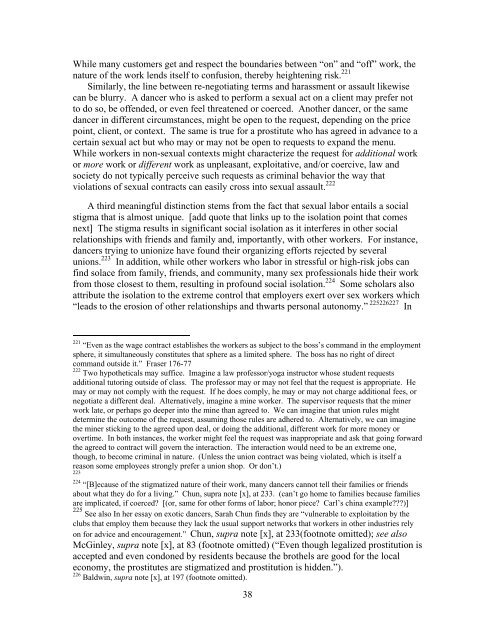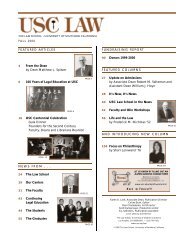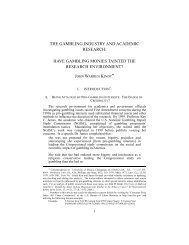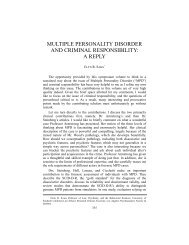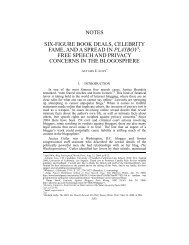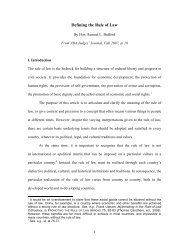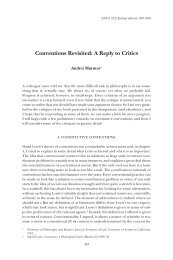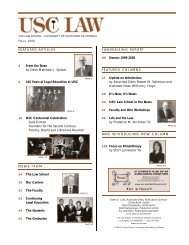1 Regulating Sex Work Adrienne D. Davis VERY ROUGH DRAFT ...
1 Regulating Sex Work Adrienne D. Davis VERY ROUGH DRAFT ...
1 Regulating Sex Work Adrienne D. Davis VERY ROUGH DRAFT ...
You also want an ePaper? Increase the reach of your titles
YUMPU automatically turns print PDFs into web optimized ePapers that Google loves.
While many customers get and respect the boundaries between “on” and “off” work, the<br />
nature of the work lends itself to confusion, thereby heightening risk. 221<br />
Similarly, the line between re-negotiating terms and harassment or assault likewise<br />
can be blurry. A dancer who is asked to perform a sexual act on a client may prefer not<br />
to do so, be offended, or even feel threatened or coerced. Another dancer, or the same<br />
dancer in different circumstances, might be open to the request, depending on the price<br />
point, client, or context. The same is true for a prostitute who has agreed in advance to a<br />
certain sexual act but who may or may not be open to requests to expand the menu.<br />
While workers in non-sexual contexts might characterize the request for additional work<br />
or more work or different work as unpleasant, exploitative, and/or coercive, law and<br />
society do not typically perceive such requests as criminal behavior the way that<br />
violations of sexual contracts can easily cross into sexual assault. 222<br />
A third meaningful distinction stems from the fact that sexual labor entails a social<br />
stigma that is almost unique. [add quote that links up to the isolation point that comes<br />
next] The stigma results in significant social isolation as it interferes in other social<br />
relationships with friends and family and, importantly, with other workers. For instance,<br />
dancers trying to unionize have found their organizing efforts rejected by several<br />
unions. 223 In addition, while other workers who labor in stressful or high-risk jobs can<br />
find solace from family, friends, and community, many sex professionals hide their work<br />
from those closest to them, resulting in profound social isolation. 224 Some scholars also<br />
attribute the isolation to the extreme control that employers exert over sex workers which<br />
“leads to the erosion of other relationships and thwarts personal autonomy.” 225226227 In<br />
221 “Even as the wage contract establishes the workers as subject to the boss’s command in the employment<br />
sphere, it simultaneously constitutes that sphere as a limited sphere. The boss has no right of direct<br />
command outside it.” Fraser 176-77<br />
222 Two hypotheticals may suffice. Imagine a law professor/yoga instructor whose student requests<br />
additional tutoring outside of class. The professor may or may not feel that the request is appropriate. He<br />
may or may not comply with the request. If he does comply, he may or may not charge additional fees, or<br />
negotiate a different deal. Alternatively, imagine a mine worker. The supervisor requests that the miner<br />
work late, or perhaps go deeper into the mine than agreed to. We can imagine that union rules might<br />
determine the outcome of the request, assuming those rules are adhered to. Alternatively, we can imagine<br />
the miner sticking to the agreed upon deal, or doing the additional, different work for more money or<br />
overtime. In both instances, the worker might feel the request was inappropriate and ask that going forward<br />
the agreed to contract will govern the interaction. The interaction would need to be an extreme one,<br />
though, to become criminal in nature. (Unless the union contract was being violated, which is itself a<br />
reason some employees strongly prefer a union shop. Or don’t.)<br />
223<br />
224 “[B]ecause of the stigmatized nature of their work, many dancers cannot tell their families or friends<br />
about what they do for a living.” Chun, supra note [x], at 233. (can’t go home to families because families<br />
are implicated, if coerced? [(or, same for other forms of labor; honor piece? Carl’s china example???)]<br />
225 See also In her essay on exotic dancers, Sarah Chun finds they are “vulnerable to exploitation by the<br />
clubs that employ them because they lack the usual support networks that workers in other industries rely<br />
on for advice and encouragement.” Chun, supra note [x], at 233(footnote omitted); see also<br />
McGinley, supra note [x], at 83 (footnote omitted) (“Even though legalized prostitution is<br />
accepted and even condoned by residents because the brothels are good for the local<br />
economy, the prostitutes are stigmatized and prostitution is hidden.”).<br />
226 Baldwin, supra note [x], at 197 (footnote omitted).<br />
38


